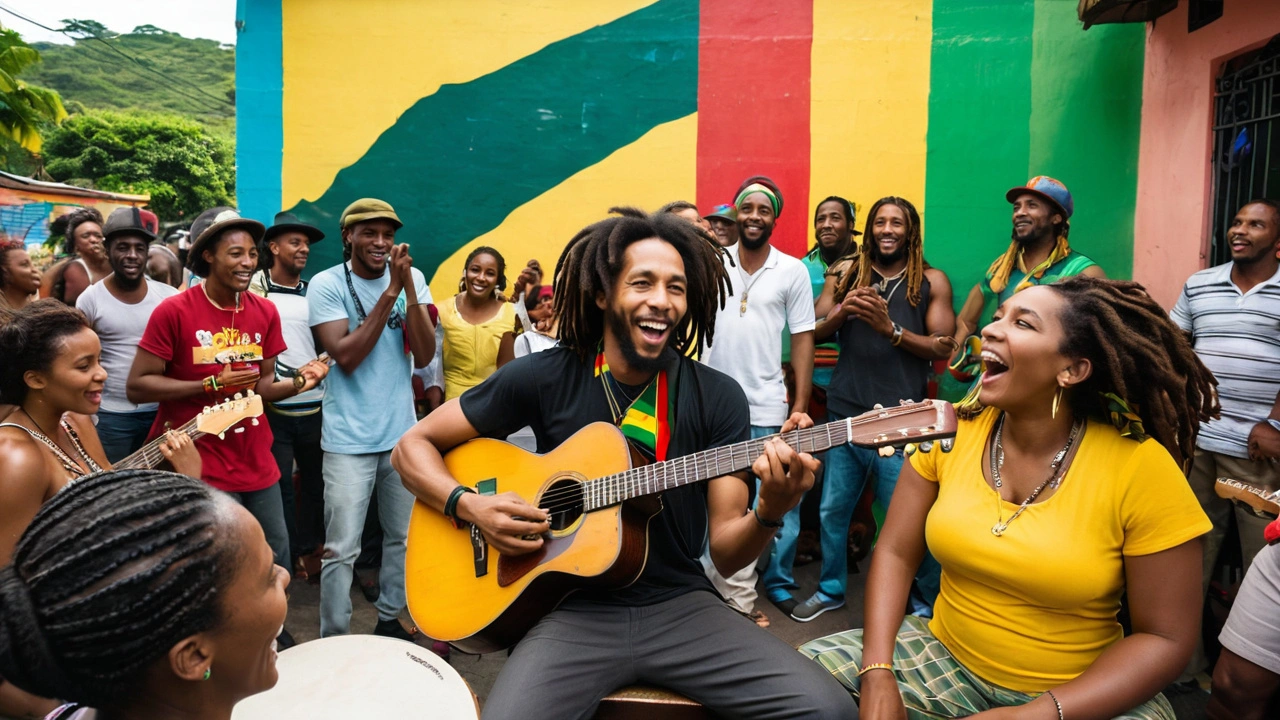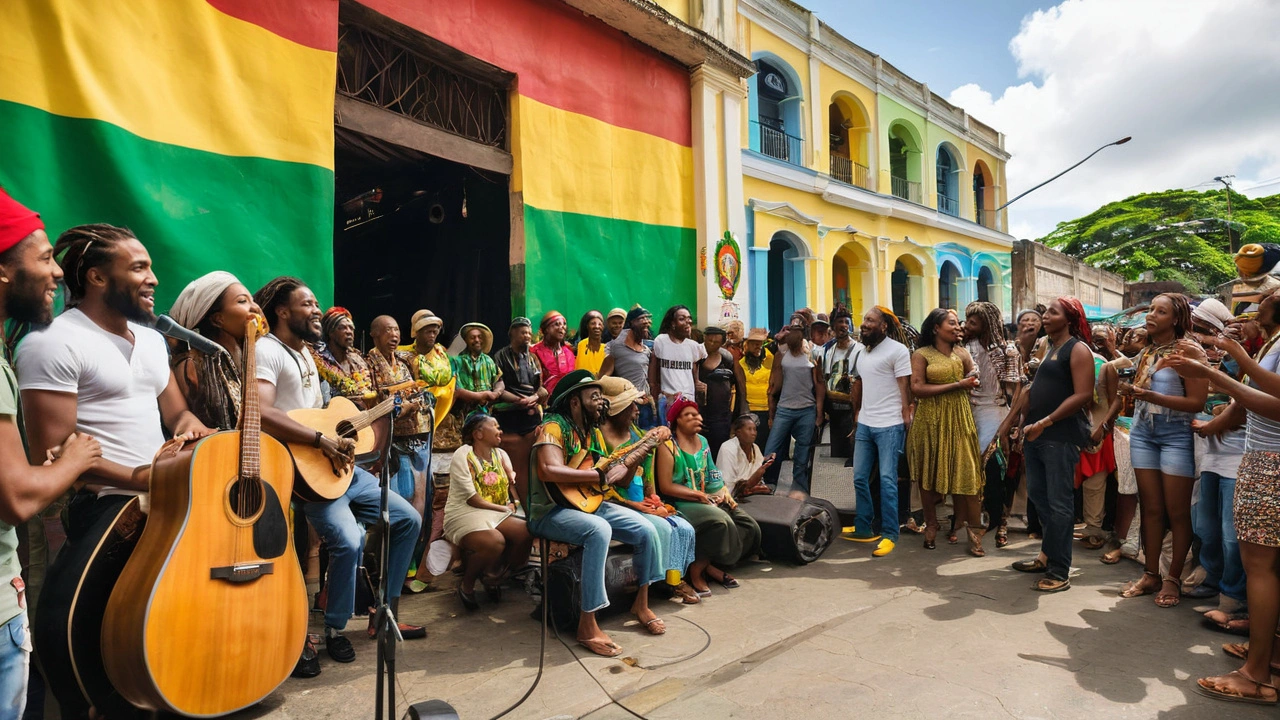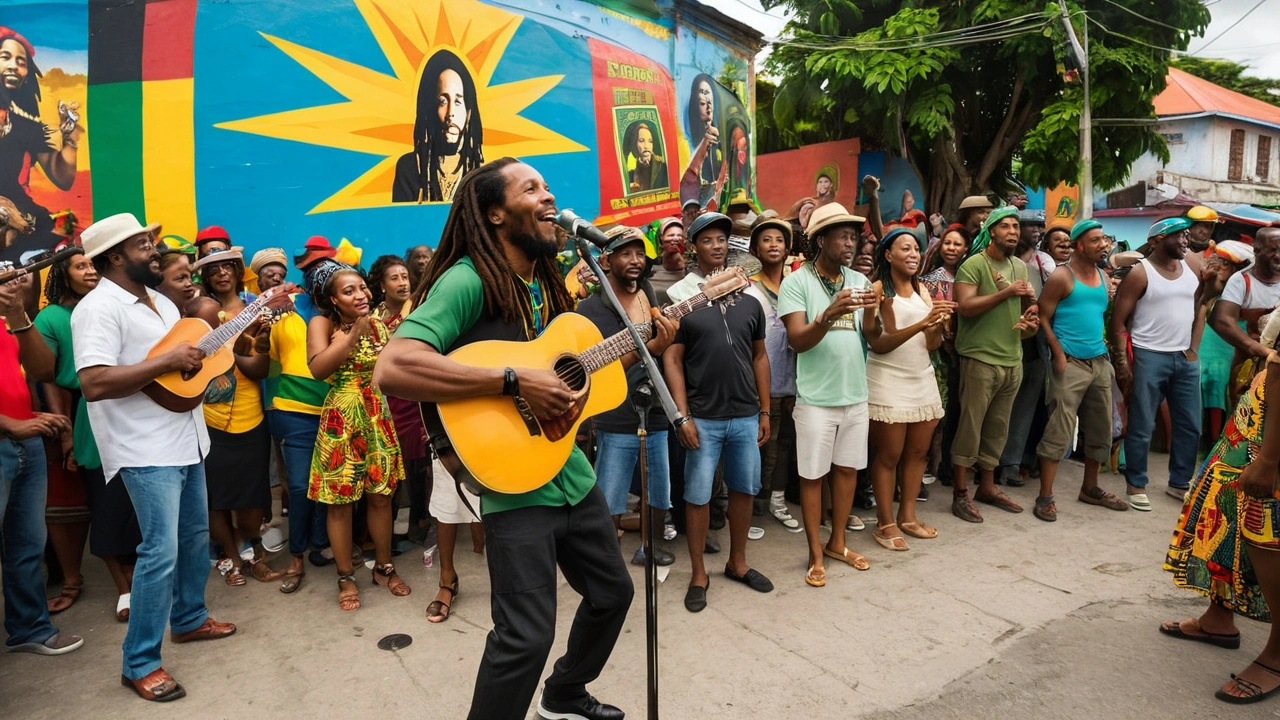Reggae music stands as a powerful symbol of resistance against oppression and a call for unity and peace. Born in the heart of Jamaica during the late 1960s, this genre quickly became a voice for social commentary, deeply intertwined with the struggles and aspirations of its people.
The compelling beats and heartfelt lyrics of reggae have echoed far beyond the shores of the Caribbean, stirring hearts and inspiring movements worldwide. It's not just music; it's a movement, a message, and often, a rallying cry against injustice.
From its early days with pioneers like Bob Marley, who sang of love, unity, and resistance, to its influence on contemporary artists who continue to address social issues, reggae remains a powerful force. Its ability to bring together diverse cultures and amplify voices of protest and change underlines its enduring relevance.
- Origins of Reggae
- Reggae Icons and Their Messages
- The Global Influence of Reggae
- Modern Reggae and Social Issues
- Reggae's Future and Legacy
Origins of Reggae
Reggae music originated in Jamaica in the late 1960s, emerging from other musical genres like ska and rocksteady. These earlier styles laid the groundwork with their upbeat rhythms and brass instrumentation, but reggae took a unique turn by slowing down the tempo and infusing the music with a deeper sense of soul and spirituality. The beats were more pronounced and the messages in the lyrics began to focus not just on love and romance, but on social justice, poverty, and resistance to oppression.
One of the key architects of reggae was Toots Hibbert, the lead singer of Toots and the Maytals. His song
Reggae Icons and Their Messages
Reggae music owes much of its global popularity and powerful voice to a number of key icons who used their platforms to address social and political issues. These artists weren't just entertainers; they were storytellers, activists, and leaders whose lyrics often spoke to the struggles and triumphs of the marginalized. At the forefront is Bob Marley, whose songs like 'Get Up, Stand Up' and 'Redemption Song' still resonate as anthems of liberation and resistance. Marley's music was deeply influenced by his Rastafarian beliefs, which emphasized peace, love, and unity, but also pointed out the social injustices and the need for change. His lyrics often touched on themes such as poverty, political corruption, and human rights.
Beyond Bob Marley, there are other influential figures like Peter Tosh and Bunny Wailer, who were also members of the original Wailers band. Peter Tosh was known for his militant stance on equality and justice. Songs like 'Equal Rights' and 'Fight Apartheid' were not just music tracks but rallying cries for movements worldwide. Tosh's boldness in addressing controversial topics made him a significant figure in the fight against oppression.
Jimmy Cliff is another iconic name in reggae. His hit song 'The Harder They Come' became an anthem for the oppressed and is often cited as one of the most influential reggae songs ever. Cliff's music did more than entertain; it provided hope and voiced the frustrations and aspirations of an entire generation facing systemic inequalities. His lyrical storytelling brought global attention to the struggles faced by people in Jamaica and other parts of the world.
Moving to the present, artists like Damian Marley, also known as Jr. Gong, continue to carry the torch. Damian's music, such as in the song 'Welcome to Jamrock,' addresses modern social issues including crime and poverty. His work maintains the essence of his father's legacy while addressing contemporary issues with a fresh perspective. Damian's collaboration with other global artists has helped to spread reggae's message to a broader audience, making it more accessible and impactful.
Women in reggae have also played crucial roles in delivering powerful messages. Rita Marley, Marcia Griffiths, and Judy Mowatt, also known as the I-Three, supported Bob Marley and had their own successful careers. Their voices added depth and nuance to the reggae message, emphasizing gender equality and empowerment. Queen Ifrica and Etana are modern female artists who continue to break barriers and speak on issues such as domestic violence and women's rights through their powerful songs.
In today's world, reggae artists are increasingly collaborating with artists from other genres to spread their message even further. The fusion of reggae with hip-hop, rock, and other genres has created a new avenue for addressing social issues while keeping the heart and soul of reggae intact. As a result, the timeless messages of peace, love, and resistance continue to inspire people worldwide.

The Global Influence of Reggae
The rise of reggae from the small island of Jamaica to a global phenomenon is nothing short of extraordinary. At its core, reggae music has always been a vessel for powerful messages of peace, love, and social change, which has resonated with listeners worldwide, transcending cultural and geographic boundaries.
One of the most significant factors behind reggae's international impact is the iconic figure of Bob Marley. His music, laden with sweet melodies and poignant lyrics about love, unity, and resistance, became anthems for people fighting oppression and seeking justice around the world. Marley's songs like "One Love" and "Redemption Song" are immortal, bringing people together and encouraging them to stand up for what is right.
The influence of reggae didn't stop with Bob Marley. The genre has inspired countless artists and bands across the globe. For instance, in the UK, reggae merged with punk in the 1970s, leading to the creation of bands like The Clash, who incorporated reggae rhythms in songs such as "Police on My Back" and "(White Man) in Hammersmith Palais." Reggae's ability to blend with other genres and still maintain its core message of social justice and unity is one of its most remarkable traits.
Even outside the typical music landscape, reggae's influence can be seen in social movements. During the apartheid era in South Africa, reggae became anthems for black liberation. Artists like Lucky Dube used reggae to spread messages against racial injustice. Similarly, in the United States, the sounds of reggae were adopted by the civil rights movement, echoing the call for equality and human rights.
Remarkably, the spread of reggae music has also led to the formation of reggae communities in places you might not immediately associate with the genre. In Japan, reggae has found a passionate following, with cities like Tokyo hosting annual reggae festivals that draw thousands of fans. Far from the Caribbean, these fans embrace the music and its message, creating their unique spin on the genre and incorporating traditional Japanese elements.
In terms of promoting cultural identity, reggae serves as a cultural ambassador for Jamaica and the wider Caribbean. Through its rhythmic beats and heartfelt lyrics, reggae has introduced people worldwide to the rich cultural tapestry of this region. This cultural exchange has fostered understanding and appreciation among diverse groups, making reggae a bridge between different cultures.
Reggae's global influence is perhaps best evidenced by the recognition of reggae music by UNESCO as an intangible cultural heritage of humanity. This designation acknowledges not only the genre's artistic value but also its role in promoting dialogue, encouraging social change, and fostering a sense of community.
As Bob Marley once said, "One good thing about music, when it hits you, you feel no pain." This sentiment captures the unifying power of reggae, a genre that continues to inspire, uplift, and bring people together, regardless of their backgrounds.
The future of reggae looks bright, with new artists emerging from different corners of the world, each bringing their unique perspectives and experiences to the genre. Reggae remains an enduring force in the global music scene, continuing to challenge injustices and inspire movements for change across the globe.
Modern Reggae and Social Issues
Reggae music continues to be a powerful tool for addressing social issues in the modern world. Artists today are not just creating catchy tunes; they are raising awareness and calling for change. This enduring tradition against injustice is deeply rooted in the genre's history and uniquely positions reggae as a voice for the marginalized and oppressed.
One of the most influential modern reggae artists is Chronixx, who uses his music to bring attention to issues such as systemic inequality, police brutality, and environmental degradation. Tracks like "Skankin' Sweet" and "Here Comes Trouble" are not just hits but anthems for modern social movements, energizing and uniting listeners under a common cause.
Another significant figure in today's reggae scene is Koffee, whose youthful energy and poignant lyrics have captured the hearts of millions. Her song "Rapture" speaks to the dreams and struggles of the youth in a world that often overlooks them. Her success is paving the way for future generations of reggae artists who are socially conscious and committed to making a difference.
Beyond individual artists, modern reggae has also influenced various social movements. From supporting Black Lives Matter protests to amplifying the climate change discourse, reggae's influence is seen and felt worldwide. These movements gain strength and visibility through relatable and powerful reggae themes, elevating the genre's significance beyond entertainment.
With the rise of digital platforms, reggae artists have a wider reach than ever before. Platforms like YouTube, Spotify, and Instagram allow musicians to connect with global audiences instantly. This connectivity not only spreads their messages faster but also allows for immediate feedback and interaction, creating a sense of global solidarity and purpose.
Modern reggae also connects with other genres, blending traditional reggae sounds with hip-hop, pop, and electronic music to appeal to a broader audience. This fusion introduces the messages of reggae to new listeners and ensures that the core principles of the genre continue to be relevant.
The role of reggae in contemporary activism is highlighted by its use in various grassroots projects and community initiatives. Organizations often harness the power of reggae to raise funds, increase awareness, and inspire action. These efforts underscore reggae’s potential for creating real, tangible impacts on society.
The late great Bob Marley once said, "One good thing about music, when it hits you, you feel no pain."This statement remains true today, as modern reggae music strikes a chord with listeners worldwide, inspiring them to stand up against injustice and strive for a better world.
The future of reggae lies in its ability to adapt and remain relevant while staying true to its roots. As modern artists continue to tackle contemporary social issues, reggae will undoubtedly keep its place as a crucial voice in the fight for justice and equality.

Reggae's Future and Legacy
Reggae music, with its deep roots in social justice and protest, continues to thrive and evolve, mirroring the ongoing struggles and aspirations of people worldwide. As new generations of artists embrace the genre, they bring fresh perspectives and innovative sounds while staying true to reggae's core message of unity and resistance.
The digital age has opened up unprecedented opportunities for reggae artists to reach global audiences. Platforms like YouTube, Spotify, and SoundCloud have democratized music distribution, allowing up-and-coming reggae musicians to gain visibility without the traditional barriers of the music industry. This accessibility has ensured that reggae's soul-stirring beats and powerful lyrics resonate with more people than ever before.
In recent years, several young artists have emerged, blending traditional reggae sounds with contemporary influences. Artists like Chronixx, Koffee, and Protoje are at the forefront of this renaissance. Their music addresses current social issues, from political corruption to climate change, ensuring reggae remains relevant in today's world. By infusing reggae with elements of hip-hop, electronic music, and other genres, they attract a wider audience while honoring their reggae heritage.
Reggae's influence extends beyond music alone. The genre has inspired various cultural movements and lifestyles. The Rastafari movement, with its emphasis on peace, unity, and respect for all living beings, is inextricably linked to reggae. This cultural symbiosis has helped spread reggae's messages of love and resistance to all corners of the globe.
“Reggae music has a way of reaching into the hearts of the people, making them aware of their cultural and spiritual roots.” - Marlon James, Jamaican Author
Reggae has also found a place in educational settings. Universities and schools worldwide now offer courses on reggae's history and impact, acknowledging its role in global social movements. This academic recognition helps preserve reggae's legacy for future generations, ensuring its revolutionary spirit lives on.
The future of reggae looks promising, with a blend of tradition and innovation driving the genre forward. Community-run radio stations, reggae festivals, and social media movements continue to celebrate and promote reggae's timeless messages. Meanwhile, collaborations between reggae artists and musicians from other genres highlight its universal appeal and adaptability.
While reggae has come a long way since its early days, its essence remains the same. It is a heartfelt cry for justice, a call for unity, and a celebration of cultural identity. With each new generation, reggae will undoubtedly continue to inspire, empower, and bring people together, proving that its rhythm is as unstoppable as the quest for equality and peace.

